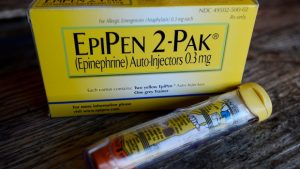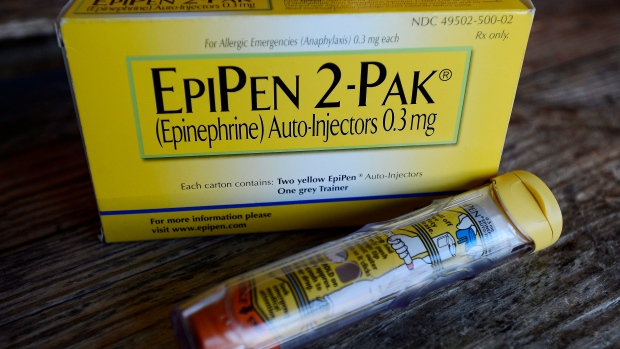COMM 101 Blog Post 1: EpiPen Price Furor Heats Up in the U.S.
Article: CBC News EpiPen Price Furor Heats Up in the U.S.

Topic: Business Ethics
EpiPen, also known as Epinephrine auto-injector is an emergency drug for the treatment of people with mild to severe allergic reactions to things such as pollen, certain foods, dust, bug bites and or other medicines. When exposed to an allergenic substance, the individual may experience anaphylactic shock in which the only fast treatment would be injecting the EpiPen to relief their symptoms through the muscle tissue in the thigh.
As can be inferred, EpiPens are extremely important when it comes to allergies as it often is a life-or-death situation. However, the Mylan Pharmaceutical company, the only EpiPen producer in the US who currently is holding a monopoly, stated that the price of these life-saving products have to be raised in order to reflect the ‘”important product features and the value the product provides”‘(Drug price hikes can damage company reputations: White House on EpiPen furor). Furthermore, with the incentive to recognize the value of EpiPens, though there were no changes made to the product since 2009, the price these auto-injectors spiked to $600 USD for a pack of two – a 400 percent increase during that period in the U.S. Luckily, the price of EpiPens sold in Canada remained stagnant throughout the years at a price at around $120 CAD.
When the price of a product skyrockets, the affordability drops – making the product more scarce. After the raise in price, the accessibility to EpiPens for certain individuals with low income would decrease tremendously. Likewise for certain needed medicine, situations like this would result in both positive and negative alternatives. The positive would be resulting in a greater increase in profit. Since Mylan is aware that the need for EpiPens is an inelastic demand, with the increase in price, the demand is assumed to remain static as this medication is needed or even required for people with severe allergies, thereby using this to their advantage and increasing their profit. This can be seen as an unethical business strategy regarding the general public as it is only concerned with profit. On the other hand, the possibility of stirring a black market is always in question as they raise prices of products on high demand. Ultimately, this raise in price of EpiPens can fluctuate the country’s Gross Domestic Production (GDP) as black market transactions are not counted in the GDP. Another negative outcome is that the decreased affordability of EpiPens would discourage people from purchasing it regarding their financial circumstance. As income for some is unstable in the US, when weighing their opportunity costs of EpiPens, people often turn away from spending $600 USD on themselves and is in favour of saving that money while essentially risking their life.
Word Count: 446
Work Cited:
- Khazan, O. (2016, August 24). Have You Ever Tried to Buy an EpiPen? Retrieved September 13, 2017, from https://www.theatlantic.com/health/archive/2016/08/epi-pens/497126/
- Mazziotta, J. (2016, August 29). EpiPen Price Increase Was Necessary Says CEO as They Create $300 Generic Option. Retrieved September 12, 2017, from http://people.com/bodies/epipen-price-increase-was-necessary-says-ceo-as-they-create-300-generic-option/
- News, C. (2016, August 24). Drug price hikes can damage company reputations: White House on EpiPen furor. Retrieved September 12, 2017, from http://www.cbc.ca/news/health/epipen-price-1.3734214
- Ubelacker, S. (2017, March 24). Canada won’t see inflated EpiPen prices: allergy official. Retrieved September 12, 2017, from https://beta.theglobeandmail.com/news/national/canada-wont-see-inflated-epipen-prices-allergy-official/article31570003/?ref=http%3A%2F%2Fwww.theglobeandmail.com&
